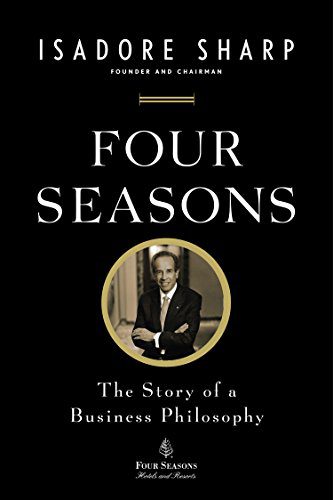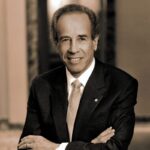success is not what you do on your own; it’s how many people have come along with you to reach higher than their expectations ever were.
In Four Seasons: The Story of a Business Philosophy, Canadian hotelier Isadore Sharp shared his life experience and the business philosophy that help him build one of the world’s biggest hotel chains: Four Seasons Hotels and Resorts,
If quality is your edge, you can’t compromise it.
The four pillars of the four seasons business model: Quality, Service, Culture, and Brand.
Dad
First and foremost, of course, was the influence of my father, for he taught me how vital people are to success in business. Dad was the most tolerant, kindest, and most positive-thinking person I’ve ever known. His example and his unquestioning and unconditional faith in me are the underlying reasons for whatever I have achieved.
Mother
Our mother was the undisputed head of our family, and in business, social, and family affairs, her word was law. At home, we children did unquestioningly whatever she told us. But outside the house, at an early age, we were independent.
To accomplish great things we must first dream, then visualize, then plan . . . believe . . . act! —ALFRED A. MONTAPERT, American author
Upbringing
Neither she nor Dad had books from which to read us bedtime stories, and they couldn’t have read them if they had. Our early childhood learning was from our parents’ actions and from the street, not untypical of immigrants bringing up youngsters here at that time.
By the time I reached my mid-teens, we had moved some fifteen times. That meant changing schools: as always, on our own. And being trusted that we knew what to do made us, I believe, independent at a very early age.
Schooling
Attending various schools as a teenager, I always starred in sports: hockey, football, basketball, track and field. I was a popular guy but a lousy student. School to me was a place to have fun. It wasn’t until my last year at Ryerson Polytechnical School, now a university, that I really focused on education.
I went to Ryerson to study architecture, because it related to building and I had every intention of making construction my life’s work. In my first year at Ryerson I played all the sports and was voted Athlete of the Year. In my final year, though still playing sports, I discovered, I’m not sure how, that riding the learning curve has its own appeal, and that year I won a silver medal for academic.
All business proceeds on belief: Trying to run a company without a set of beliefs is like trying to steer a ship without a rudder. —ANONYMOUS
Max Sharp & Son.
On graduating from Ryerson at twenty-one years of age, I went immediately into construction with my father, doubling the size of his company. It’s usually difficult for a son to begin work under his father, but for me it was the other way around. Perhaps because I had gone to college and studied drafting and architecture, Dad stepped back to let me take over Max Sharp & Son.
A partnership is a legal association to achieve some business purpose. But an alliance is a bonding of people to further their common interests, a much closer connection.
Naming Four Seasons
We needed a name, and someone came up with “Thunderbird.” But on checking it out, we found it already taken. We kept looking, leafing through phone books to find a name that stood out. Then Eddie remembered a hotel in Munich he had stayed at during one of his buying trips, the finest hotel he knew, the Vier Jahrzeiten. That translated as Four Seasons. It sounded right. And that was the extent of our market research for a name.
Vancouver Gaffe
In Vancouver, on waterfront land known as Coal Harbour, adjacent to Stanley Park, I organized and readied for construction fifteen acres for a thousand apartments and a two-hundred-room hotel. Our partner was CN Pension Fund. They were putting up most of the money. We only contributed $600,000 for a full half interest.
But that was exactly what they did: They took a vote, won, and expropriated our land, so that Max Sharp & Son ended up with nothing. That was one of my biggest gaffes, one that might have again altered the course of my life. If that project had gone ahead and I had built all those apartments, I could have made so much money that I might never have become a hotelier.
That near-ruinous experience changed my thinking on hotel investment. I decided that in the future we would protect the company financially by capping our share of ownership at a small percentage of equity, no more than $3 million to $6 million per property. This was based on a simple principle: invest no more than our hotel fees would give us over the first five years, an amount we could easily borrow on our management contract, and if more money to invest was required, we had the option to reduce our equity or put up our share.
We are going to win on quality. Quality is far and away the chief factor in competitiveness.
Service Orientation
Growing up with three sisters, I’d also learned something of women’s habits: I knew that while traveling, because they don’t like to wash their hair with soap, they usually carry a small bottle of shampoo. So we put shampoo in all our rooms. And that was a first. Today you can’t go into any hotel or motel in the world without seeing shampoo in the bathroom.
Quality doesn’t necessarily mean luxury. It means giving customers what they expect, meeting customers’ expectations every time. That’s performance, value. We are only what we do, not what we say we are.
We initiated many more ideas to enhance customer appreciation. We introduced fitness centers and no-smoking floors. We anticipated trends in food with low-fat, low-salt haute cuisine. We put shampoo, hair dryers, makeup mirrors, and bathrobes in rooms for guests who prefer to travel light.
Each room was slightly larger than our competitors’ regular rooms, with quieter plumbing, a better showerhead, and a bed with a comfortable custom-made mattress. We offered all this, plus an abundance of carefully chosen details, from the right pillow to the softest toilet tissue to bouquets of fresh flowers daily. Not all my senior people agreed with all these decisions on quality.
Service as competitive Advantage
In the past, success was believed to depend primarily on product and location, and both, of course, were still imperative. We continually upgraded convenience and comfort to ensure we never fell behind. And each property we developed was also aesthetically individual, reflecting the culture and traditions of its locale. But while product was essential to sector success, product, unlike service, could be bought. Product alone was not the sustainable competitive advantage required to join the ranks of dominant sector leaders.
People often ask me about my original vision for Four Seasons.
Well, the truth is that there was no vision or grand scheme. In 1961, when I built my first hotel, I knew nothing about the hotel business. My only professional experience was in building apartments and houses. I was just a builder, and the hotel was just another real estate deal. I never thought this was going to be a career, nor did I ever imagine I would one day find myself building and managing the largest and most prestigious group of five-star hotels in the world.
When you’re too far ahead of your time, you need the temperament to handle it. The human body protects itself by the level of pain it can withstand.
The Golden Rule
Excellence in service could not be an event; it had to become a company-wide habit. To build a unified team giving consistently superior service. Without values in common, we couldn’t develop companywide trust. And without trust, we couldn’t communicate. We wouldn’t be believable.
All people are equal in our eyes, whether guests or employees. We see them that way from the start of the hiring process. There is absolutely no discrimination.
On Hiring
In hiring, then, we gave more weight to character and personality than we did to traditional résumés and technical expertise. We can upgrade technical skills with training, but no amount of training can change ingrained attitudes or create responsibility and initiative. And we were hiring not only for immediate job openings; we were hiring for positions of future leadership. Admittedly, it’s harder to hire on subjective judgment than hard data.
You’ve been successful in your career. What I want to know is who you are as a human being and how I think you’re going to treat and manage our people.
Four Seasons Culture
Morning Meetings
Four primary elements make the difference between other hotels or resorts and a Four Seasons Hotels and Resorts property: service, quality, culture, and brand. All four defining characteristics are on display and in practice daily in the ritual of the morning meeting.
Egos are not allowed in that meeting. We’re there for one reason, and that’s the guest. From Toronto to Tokyo, from Los Angeles to the island nation of Nevis, the morning meeting is conducted the same way.
In most cities, the meeting begins with our guest relations manager, who recaps who is staying at the hotel. On our organizational chart, this person’s job is the equivalent of a department head. He or she goes over the hotel’s new arrivals, extended stay guests, VIPs, and special attention guests. Because of the calibre of our guests, the rates they pay, the expectations they have, and how much we drill down to get it right for them, we couldn’t live without this position.
We keep the morning meeting as condensed as possible; forty-five minutes is a long one. The purpose is to rev everybody up, tie up loose ends from the previous day’s business, and get in the right frame of mind for the day ahead.
The Glitch Report
Next up is a review of the previous day’s mistakes in something we call the Glitch Report. Every department in the hotel is represented at the morning meeting, and each has a printout detailing what’s gone wrong and what steps may have already been taken to correct course. The Glitch Report ensures that every hotel department knows what happened and which guest it affected. We might have missed a guest with something as simple as turndown service, and everybody listens to the department head responsible as he or she articulates what went wrong. That person will go to the root cause of the problem and tell everyone what will be done to fix it in that guest’s eyes.
Whatever the issue, making it right starts with a sincere apology. It can also mean trying to do something else for them later on in their visit. It can mean an amenity such as flowers or fresh fruit skewers or a bottle of wine. It can mean an appropriate adjustment or consideration on their bill. For each guest, we strive to find the right approach in the apology. We give our staff the tools they need to do the job, and we let them know what the expectations and standards are. “This is what we want to happen at check-in.” Then, we measure. “What happened? Why did Mr. Andrews not do the standard upon check-out?”
If we make a mistake, we’re sorry and we’re sincere about it, we apologize, and we fix it right away. And when the guest comes to check out, we say, “I’m sorry about your room.”
Trust
Trust, we agreed, had been the primary reason for our success, crucial to the reputation that precedes us in every deal, in every hotel opening, and in all our operations. It’s a precondition for employee commitment because it gives management credibility, making communication believable and impelling employees to open up, cooperate, and share information. Like the invisible hand that regulates the free market, the invisible hand of trust had been our guide and our dynamic.
“Great companies first build a culture of discipline . . . and create a business model that fits squarely in the intersection of three circles: what they can be best in the world at, a deep understanding of their economic engine, and the core values they hold with deep passion.”
All the Best in your quest to get better. Don’t Settle: Live with Passion.



Comments are closed.